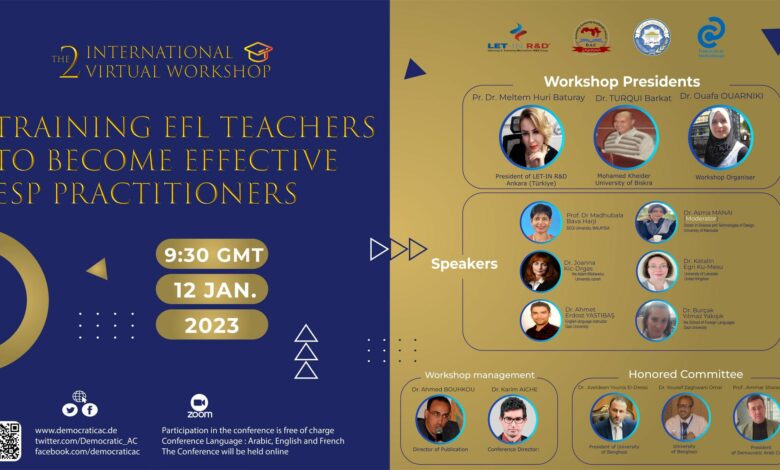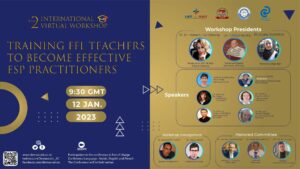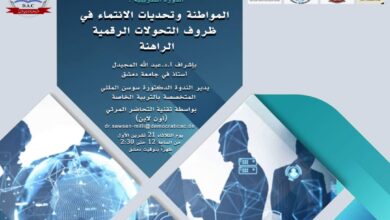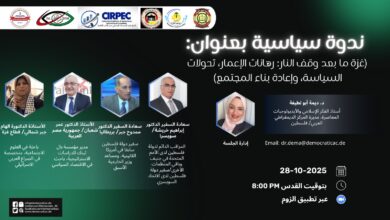The Second International Virtual Workshop on: Training EFL Teachers to Become Effective ESP Practitioners

The #Democratic_Arabic_Center based in Germany – Berlin
In collaboration with
The University of Benghazi – Libya
Laboratory of Traduction et Méthodologie –Oran2 University,Algeria
Learning & Teaching Innovations Research and Development (LET-IN R&D) Organization Ankara, Turkey
is pleased to announce The Second International Virtual Workshop on
Training EFL Teachers to Become Effective ESP Practitioners
Thursday – January 12th,2023 – 9.30-14.00 Algerian time
Workshop Presidents
- Dr.Ouafa OUARNIKI
- Dr.TURQUI Barkat
- Pr.Dr. Meltem Huri Baturay
- Prof Dr . Azeldeen Younis El-Dressi (President of University of Benghazi
- Dr. Youssif Zaghwani Omar – University of Benghazi
- Pr.Dr.Meltem Huri Baturay : President of LET-IN R&D, Ankara (Türkiye)
- Prof Dr.Ghania Ouahmiche, Mohamed Ben Ahmed,Oran2 University,Algeria
- Prof . Ammar Sharaan – President of Democratic Arab Center
Workshop management
- Conference Director: Dr. Karim AICHE
- Director of Publication : Dr. Ahmed Bohko
Introduction
English for Specific Purposes is a good option for students of different fields of study since it equips them with the necessary information of their concerned subjects as well as linguistic competence. Hence, the aim of ESP courses is to equip learners with a certain English proficiency level for a situation where the language is going to be used, i.e, target needs
It is agreed that any decision made in designing language teaching programs in ESP contexts should hinge on the learners’ needs for learning English.
However, what we can note is that there is not a separation between ESP and English for General Purposes (EGP) when it comes to syllabuses and methodology
English for Academic Purposes (EAP) and English for General Purposes (EGP) are considered to be one by the majority of teachers
In fact, what is taught in the general education or private institutions is typically English for general purposes and to some extent what is taught now in our universities under the term ESP is typical general English
Besides, needs assessment, which is a major component of ESP, rarely exists, and, if does, it is not systematic because it is only based on teachers’ intuitions. Moreover, the methodology adopted in teaching in the majority of cases is uniform
That is, a teacher would enter a class with the same kind of methodology in mind regardless of the aims of each program. Unfortunately, ESP courses in different “non-English” departments are always put “in the same basket” and labeled as programs for “Teaching English”
As a matter of fact, there are crucial parameters that ought to be taken into consideration when designing syllabuses such as the nature of language to be taught and used, the learners, the setting and the objectives to be realized.
Main Objectives of the Workshop
- -Train teachers and prepare them for their tasks as practitioners
-
Improve the teaching of ESP- in non-English departments (biology-computing-economy….)
- Significance of the Workshop
This workshop will be of great benefit for ESP teachers as it would enable them to
- Be aware of Needs Analysis importance in the field of ESP
- Conduct needs analysis
- Design Effective ESP courses that would better meet their students’ needs
Dr.Ouafa OUARNIKI
is an associate professor in didactics of teaching ESP at Ziane Achour University of Djelfa, Algeria. She is a regular presenter at conferences and her conference papers deal with teaching English for Specific Purposes, designing ESP courses, professional development of language teachers, the use of technologies in an ESP instructional environment. She peer-reviews papers for local national and international journals (U.S.A, Indonesia, Berlin, Algeria …). Her main research areas include ESAP, syllabus design and ESP training. She is an associate Editor of an indexed journal. She has recently joined the Let- IN team – Atilim University, Ankara- Türkiye as an advisory board member. She is also an active member in the laboratory of Traduction et Méthodologie (Oran 2) and the national Project P.R.F.U: Toward Critical Thinking Based EFL Class : A Must –to- Have Skill for Impacting Social Change (ENS Oran) participating in all their events, running workshops and presentations
Prof. Dr. Meltem Huri Baturay (Moderator)
is the founding leader of Turkey’s only patented international learning organization Learning & Teaching Innovations Research and Development (LET-IN) R&D and works as a faculty member and the director of the Center for Teaching and Learning at Atılım University. She published many articles in highly reputable international and SSCI indexed journals and worked as a researcher at an action in COST (European Cooperation in Science and Technology) which was supported by the EU Framework Programme Horizon 2020. She also participated in TUBITAK (The Scientific and Technological Research Council of Turkey) and Erasmus+ KA2 projects as a researcher. At the moment, she is a researcher in 2 international Ed Tech projects in Bangladesh and in South Africa. She studies use of innovative technologies like Metaverse, Augmented and Virtual Reality at Education, Distance Education, technology-assisted language teaching, and Design of Multimedia Enriched Teaching Materials
Pr. Dr. Madhubala Bava Harji
is currently attached to the Faculty of Education, Languages, Psychology, and Music, SEGI University, Kota Damansara Malaysia. She is the Program Leader for Ph.D. in Education Program. She served at three teacher training colleges before joining the first private university, Multimedia University, MMU, for 23 years. She held various administrative positions, including, Dean of the Faculty of Applied Communication, Dean of Learning Institute for Empowerment, Director of the Institute of Modern Languages and Communication, Director of Centre of Modern Languages and Communication, Director of MMU Press, Head of Centre for Diploma Programs and Head of Effective Teaching Methodology in MMU
Passionate about research, she is actively involved in research projects and has published numerous SCOPUS-indexed journal papers, ISI-indexed conference proceedings, non-indexed papers, textbooks, and MMU’s 20th Commemorative Coffee table book. She actively reviews journal papers in various international journals. She also supervises undergraduate capstone projects and final-year projects. She currently supervises 18 Ph.D. and 3 Master’s students
Dr.Katalin Egri Ku-Mesu
is a Teaching Fellow at the University of Leicester United Kingdom and works on the MA in Applied Linguistics and TESOL programme. She is also an External Examiner in English for Academic Purposes (EAP) at Xi’an Jiaotong-Liverpool University, Suzhou, China. She holds a PhD in Applied Linguistics and a Doctor Philosophiae degree in American Literature. Her professional experience and interests include English language teaching, English language teacher training and education, EAP, academic literacies, English as a medium of instruction (EMI), language teaching management, language and culture, intercultural communication and discourse analysis. She serves on the committee of the IATEFL ESPSIG as Editor-in-Chief of the ESPSIG journal Professional and Academic English
Dr. TURQUI Barkat
is an associate professor in Applied Linguistics and Discourse Analysis at Mohamed Kheider University of Biskra, Algeria. He occupied different Pedagogical and Administrative Responsibilities. His fields of interest include : Discourse Analysis- Applied Linguistics- ESP, innovative Methods of Language Teaching- Intercultural Approach to Foreign Language Teaching. He published a good number of articles and took part in different national and international conferences
Dr. Asma MANAI (Moderator)
(Doctor in Science and Technologies of Design, University Lecturer at the higher Institute of Science and Technologies of Design, University of Manouba
Dr.Joanna Kic-Drgas
Dr Joanna Kic-Drgas graduated from linguistics and economics and is employed as an Assistant Professor in Teaching Languages for Specific Purposes in the Institute of Applied Linguistics at the Faculty of Modern Languages and Literature of the Adam Mickiewicz University in Poznań. The researcher received a grant of Ministry of Education. Joanna Kic-Drgas has ten years of experience in teaching languages for specific purposes and has authored and co-authored academic and professional papers focused on teaching methodology, intercultural communication, multilingualism and international cooperation. Since 2017 she has been a tutor for incoming Erasmus students from Germany. Since 2018 she leader of Polish team in the Erasmus Plus Project TRAILs (LSP Teacher Training Summer School), 2018-1-FR01-KA203-048085, KA2 “Cooperation for Innovation and the Exchange of Good Practices”, 2018-2020. She is a member of the two key associations in Poland, the Polish Association of Foreign Language Teachers and the Association of Applied Linguistics
Dr. Burçak Yılmaz Yakışık
Burçak Yılmaz Yakışık works at the School of Foreign Languages at Gazi University. She received her PhD at the ELT Department at Gazi University, graduating in 2012. Her doctoral thesis explored the use of dynamic assessment of ELT students’ oral skills. She worked as a test writer, academic coordinator, head of the unit of basic languages, teacher trainer, and vice-director of the school of foreign languages at Gazi University. Currently, she is teaching EFL and ESP courses at the Unit of Modern Languages at the School of Foreign Languages. She worked as a researcher at the ILTERG Project ‘International Language Teacher Education Research Group’, which was funded by the Turkish National Agency and co-funded by the European Commission. She is currently working as a participant and mentor in the e-Lot project (Leaders of EAP Project), funded by British Council. Her research areas are individual differences; teacher education; teacher agency; learner and teacher motivation; dynamic assessment; and reflective practice in teacher education
Dr. Ahmet Erdost YASTIBAŞ
Ahmet Erdost YASTIBAŞ has been working as an English language instructor at Gazi University and has a Ph.D. degree in English language teaching. He has taught EGP, EAP, and ESP courses at different universities in Turkey. His research interests include technology-enhanced language teaching, language assessment and evaluation, and language education for sustainable purposes
To subscribe, please communicate exclusively through the – Zoom link
Broadcasting live through page of The #Democratic_Arabic_Center based in Germany – Berlin on Facebook, the attached link is: –
https://www.facebook.com/democraticac/?ref=pages_you_manage
Democratic Arab Center For Strategic, Political & Economic Studies
Deutschland – Berlin
Continue on the Viper-Whats App : 00491742783717





